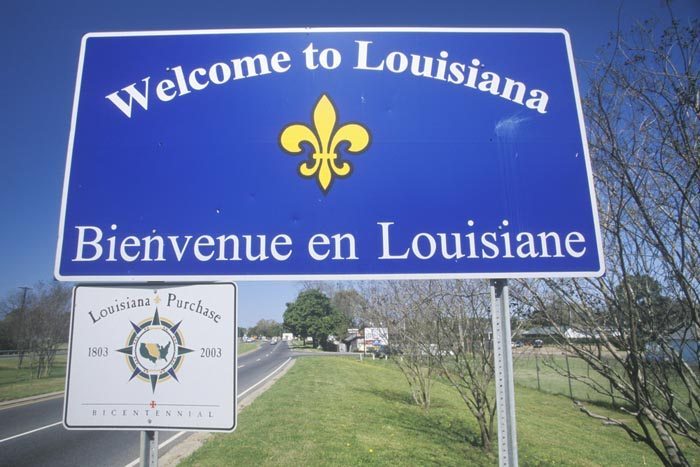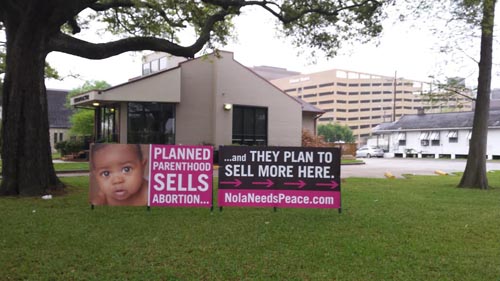Louisiana Anti-Choice Advocates, Lawmakers Exploit ‘Black Genocide’ Myth
State lawmakers and anti-choice activists alike have been working to restrict access to abortion services in Louisiana, employing rhetoric and tactics that are seen by some community leaders as exploiting racial fears in Black communities.

State lawmakers and anti-choice activists alike have been working to restrict access to abortion services in Louisiana, employing rhetoric and tactics that are seen by some community leaders as exploiting racial fears in Black communities.
In March, the Louisiana House Committee on Health and Welfare voted unanimously to pass HB 388, which would require abortion providers to gain admitting privileges at a hospital within 30 miles of where they perform abortions; the bill then easily passed the house. (It’s now been introduced in the senate, where it will likely pass, and it is expected that Gov. Bobby Jindal would sign the bill if it makes it to his desk.)
Louisiana currently has five clinics that provide abortion care. Reproductive rights advocates say HB 388 would immediately close three of those clinics, leaving the only two clinics that provide abortions in the state in Shreveport.
Rep. Katrina Jackson (D-Monroe), the sponsor of the legislation, said on the house floor that HB 388 is about the “safety of women.” But Jackson, who worked with Louisiana Right to Life and the Bioethics Defense Fund on drafting the legislation, expressed a different justification during the bill’s committee hearing: Jackson characterized the higher rate of abortions among Black women, compared to white women, in the United States as “Black genocide.”
Reproductive rights advocates pointed to the disproportionate impact the bill would have on low-income women and women of color. “I don’t want people advocating erroneously for African-American women,” Jackson said in response.
Sylvia Cochran, an administrator at the Women’s Health Care Center in New Orleans, told Rewire that when anti-choice lawmakers and activists use rhetoric that exploits racial fears, it is a losing argument.
Cochran has testified at legislative hearings against bills that would restrict access to safe, legal abortion care. Despite testifying to the detrimental effects these restrictions would have on women’s reproductive health, she says lawmakers often ignore this information. “You can’t argue with them because they don’t want to hear it unless it fits their agenda,” she said.
The abortion rate for Black women is almost five times that for white women. But, according to the Guttmacher Institute, the higher rate of abortion among Black women—and among women of color more generally—is connected to health-related racial inequalities:
[H]igher unintended pregnancy rates reflect the particular difficulties that many women in minority communities face in accessing high-quality contraceptive services and in using their chosen method of birth control consistently and effectively over long periods of time. Moreover, these realities must be seen in a larger context in which significant racial and ethnic disparities persist for a wide range of health outcomes, from diabetes to heart disease to breast and cervical cancer to sexually transmitted infections (STI), including HIV.
New Orleans City Council member LaToya Cantrell told Rewire that when lawmakers frame the abortion issue as a conspiracy against minorities, in particular Black women, it is a deliberate attempt to exploit racial fears. “It really taps into a long-standing suspicion among the African-American community, that unfortunately has a real basis in fact because of issues like forced sterilization and experimentation without consent,” said Cantrell. “But it seems like fear-mongering at its worst. The data doesn’t bear out the attempt to paint the issue in those terms.”
Race is also being used by anti-choice activists in New Orleans to promote an anti-Planned Parenthood message.
Planned Parenthood of the Gulf Coast is currently building a new facility in New Orleans—a 7,000-square-foot, $4.2 million clinic that will replace a smaller clinic in the city, which had about 7,500 visits in 2012 but does not provide abortions. The new clinic will provide abortion care, representing the first time Planned Parenthood has provided abortion services in the state.
For nearly a year, a campaign has been waged by anti-choice activists against the construction of the facility. For instance, last year 500 activists reportedly gathered at the site of the new clinic to protest what they characterize as an “abortion supercenter.”
This campaign against the new clinic has been led by the NOLA Needs Peace Coalition, which describes itself as a coalition of 26 churches and community organizations committed to building a peaceful New Orleans “both in our streets and in the womb.” Louisiana Right to Life appears to be the driving force behind the effort. The group is identified as the leader of the coalition; Louisiana Right to Life’s office phone numbers and mailing address are listed as the contact information for the coalition, and Louisiana Right to Life staff are listed as contacts.
The NOLA Needs Peace Coalition has promoted its message by purchasing television advertisements and erecting anti-choice signs and billboards. At least three such signs have been placed in predominantly Black neighborhoods and feature a picture of a Black baby alongside anti-Planned Parenthood messages.

“I see the beautiful Black baby on the signs—for me as a Black woman this is the worst [exploitation of race] that I’ve seen, in using those Black babies as if the Black community is the face of abortion in the country,” said councilmember Cantrell.
Cantrell represents some of the poorest communities in New Orleans, including the neighborhood where the new Planned Parenthood facility is being built. She says she fully supports the organization because of the importance of access to reproductive health care for people in New Orleans, particularly in low-income communities and communities of color. “The need is great,” she said.

